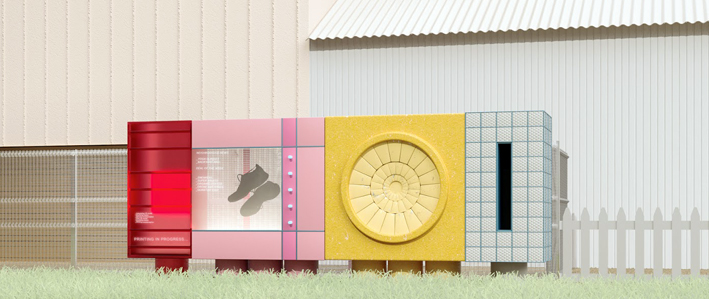Klarna research project explores future of retail
- December 8, 2020
- Steve Rogerson

Swedish shopping service Klarna has launched a research project that explores how different aspects of shopping and retail experiences might look like in the future.
In its first project, it is exploring the future of the mailbox, transforming it from a static relic to a modular platform for future ecommerce, deliveries, returns and shoppable neighbourhoods.
Called Klarna Future Shopping Lab, the ongoing research project will explore optimistic and somewhat unexpected shopping experiences. The purpose is to develop prototypes that can inspire everyone involved in the shopping experience, from retail and city planning to technology and logistics, in accelerating the evolution of shopping.
“While the prototypes developed by Klarna Future Shopping Lab are not part of our commercial product development at Klarna, their purpose is to inspire and create discussions around how the future of retail might look,” said Rasmus Fahlander, director of purchase experience at Klarna. “Guided by our philosophy of removing unnecessary friction, we believe that a lot of improvements can be made in different areas of the shopping journey that are beneficial to both consumers and retailers, and to society as a whole.”
Almost everyone has a mailbox, but in a world of digital communication, no one really uses it. In paradox, online shopping is growing exponentially, creating an increasing number of parcels on their way to homes. Meanwhile, people look for more personalised experiences, and new ways to live more sustainably. What if the mailbox could be reimagined and work as an enabler for all those things?
That is the idea behind the modular mailbox, the first prototype created by Klarna Future Shopping Lab. It is constituted by a combination of different modules focused on shopping, sharing and sustainability. Together, these transform the mailbox from a static relic, serving solely as a tool for receiving things, into a platform that is designed to cater for future shopping habits. It supports circularity and new transactions, and can make life easier, for individuals as well as neighbourhoods and communities.
“It would be strange if one and the same airline did not provide both the ticket and the return ticket,” said Fahlander. “If someone constructs the pathway into our homes, they will automatically also have created the pathways for recycling, returns or the after-life of products and packaging.”
Klarna was founded 15 years ago with a mission to create a smoother shopping experience. With Klarna Future Shopping Lab, it says it is looking 15 years ahead to explore how different areas of shopping and retail can be improved.
“We at Klarna are committed to creating the best shopping experience possible,” said Fahlander. “When we develop our services, we always look at ways to remove friction for shoppers and retailers. With Klarna Future Shopping Lab, we want to broaden our horizon and look at the bigger picture of how shopping and retail could evolve in the future.”
The development of the modular mailbox has been a collaborative process where Klarna gathers employees and external experts to develop hypotheses, which can then be brought to life through visual prototypes designed to be inspirational and fun rather than functional.
Contributors include Ana Andjelic (author of The Business of Aspiration, Sociology PhD and Forbes’ Most Influential CMOs), Iskander Smit (director of Cities of Things Lab at Delft University), Daniel Heckscher (co-founder and head of design at Note Design Studio), Cristiano Pigazzini (design manager at Note Design Studio) and Fahlander. Note Design Studio has also contributed in the design and visualisation of the modular mailbox prototype.
Klarna’s offering to consumers and retailers includes payments, social shopping and personal finances. More than 200,000 merchants, including H&M, Ikea, Expedia Group, Samsung, Asos, Peloton, Abercrombie & Fitch, Nike and AliExpress, have enabled Klarna’s shopping experience online and in-store. Klarna was founded in 2005, has over 3500 employees and is active in 17 countries.




